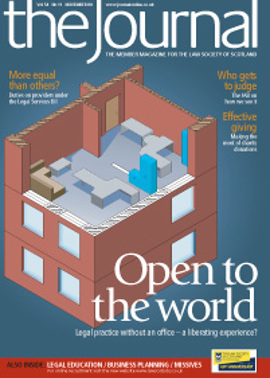Never waste a good crisis

Following the case of Park, Petitioner [2009] CSOH 122 (see also Journal, October, 56), which held that actual delivery of missives is required to produce a binding contract, there has been a debate within the profession
as to how practitioners should respond, given the previous reliance on fax and email to expedite the conclusion of missives.
In Park, Temporary Judge Malcolm Thomson QC suggested obiter that a statement by the transmitting solicitor that the original missive will be held to the receiving solicitor’s order could achieve constructive delivery. The problem with this suggestion is that it will not prevail against the ratio decidendi of the case, that unless the original missives are physically delivered, there is a risk that no effective contract will have been concluded.
To decide not to send original missives would in any event be oxymoronic and counter-intuitive to conveyancers. So there is a hybrid of constructive and actual delivery in currency. The current practice of faxing/scanning and sending originals effectively continues, but the difference is that the fax cover sheet or covering email states that the original missive is held to the receiving solicitor’s order and that the original will be sent in the post that same day. A statement of this type also appears contradictory and runs the risk that dispatch of the original missives could undermine the whole point of constructive delivery, which is the intention to hold the originals and be bound only by the fax or email transmissions. In other words it brings us back to the question in Park: if the fax or email copies are intended to be binding, then why send the originals at all?
Delivered back
There is a First Division authority that appears conclusive. In Life Association of Scotland v Douglas (1886) 13R 910, the question was whether the placing of the signed deed with Mr Douglas’s own agent, with an irrevocable mandate to deliver it, was sufficient to constitute constructive delivery before the actual delivery, which occurred after Mr Douglas’s death. The court held that de facto the deed was undelivered, and the Lord President (Inglis) stated at 911:
“It must always be kept in mind, when considering such questions, that the delivery of a deed is a matter of fact and not a matter of law.” This dictum is a clear and authoritative statement of the law.
Does this mean that the pace of transactions is back to that of the horse and cart age? Not necessarily. There is a 21st century solution – electronic missives. Some say that electronic missives are not yet possible because the E-Commerce Directive (2000/31/EC) has not been transposed. They wait in vain. The directive was transposed by the Electronic Commerce (EC Directive) Regulations 2002. Contracts that create or transfer rights in real estate were a permitted derogation. There is some talk of a clause in the forthcoming Land Registration Bill, but even if this might become a reality, it is some way off – probably 2012 at the earliest.
ARTL to the rescue?
And yet, and yet… the legal framework for electronic missives in fact already exists in s 1(2A) of the Requirements of Writing Act 1995. This provides that “An electronic document [created within the ARTL system] complying with [the Keeper’s requirements] shall be valid for– (a) the constitution of a contract or unilateral obligation for the creation, transfer, variation or extinction of a real right in land”.
The definition of what is within the ARTL system is key. Registers of Scotland will require to be persuaded to allow the use of ARTL digital signatures to be applied to third party pdf documents that are not intended to be submitted for registration. Other than that, all that seems to be required is a Keeper’s direction to formalise her requirements. If, however, any further technical changes to the 1995 Act are required, these can be speedily dealt with by an order under s 8 of the Electronic Commerce Act 2000, which section expressly provides ministers with a power to change any primary legislation by order to facilitate electronic commerce. Registers seem to be open to such an approach.
- a single, central registration authority that offers the highest standards of security and veracity in Europe;
- the potential for an “electronic papers folder” of all key conveyancing documents in a transaction; and
- it is already in place – on more than half of all firms’ desks, with more being signed up every week.
The Park case has thrown the assumed legality of the previous practice surrounding the conclusion of missives by electronic means into disarray. The threatened mail strike adds to the sense of potential crisis. However, there is a saying that you should never waste a good crisis. We need to take the inevitable step of implementing electronic missives as soon as possible, and ARTL seems to have the technical and legal framework in place to implement electronic missives now.
Euan Sinclair is a professional support lawyer at Burness LLP
In this issue
- The equality, diversity and discrimination agenda: change and challenge ahead
- Justice on the green front
- Let the light in
- Needs of the family
- Reality on the West Bank
- Outside of the box
- Effective philanthropy
- Case for the defence
- Taking on the system
- Same rules for all?
- The benchmark
- Law reform update
- From the Brussels Office
- Appreciation: David Hector MacNeill
- Halfway to the Big Bang
- The same but different
- Five steps forward
- Ask Ash
- Preparing for disaster
- Rules a-changing
- Fair competition
- Time on whose side?
- 40 days and 40 nights
- Hear the grown-ups
- Problems of transition
- Scottish Solicitors' Discipline Tribunal
- Website review
- Book reviews
- Life on the other side
- Never waste a good crisis






